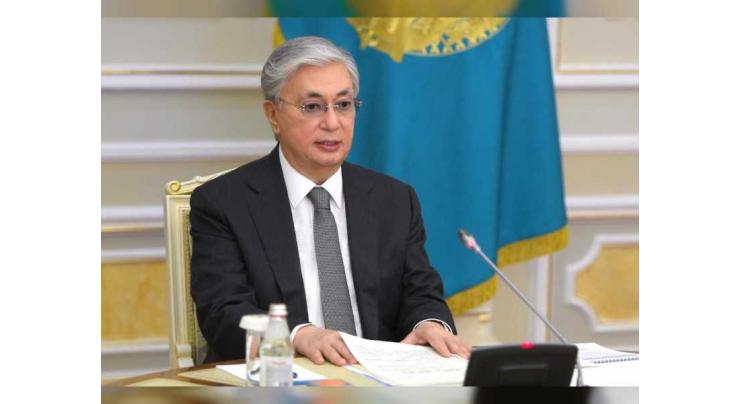
Kazakh President Signs Decree Supporting Human Rights And Democracy
Umer Jamshaid Published June 12, 2021 | 07:45 PM

(UrduPoint / Pakistan Point News / WAM - 12th Jun, 2021) NUR-SULTAN, 12th June 2021 (WAM) – The President of Kazakhstan, Kassym-Jomart Tokayev has signed a decree "On further measures of the Republic of Kazakhstan in the field of human rights".
The Decree instructs the government to approve the Plan of Priority Measures in the Field of Human Rights (Action Plan), which envisages the implementation of the following key tasks: adoption of the 9th June Decree further formalises human rights as one of the basic priorities of state policy, implementation of its provisions will further promote the protection of human rights in Kazakhstan and contribute towards building a just and progressive state.
The Decree is in line with the concept of a "listening state", put forward by President Tokayev. It envisages a government that listens to the comments and criticisms of the society. As part of this concept, the government is implementing substantial political reforms that cover three broad areas – democratisation of the country’s political system, more power to the people, and strengthened human rights.
In the field of the protection of human rights, the Office of the Commissioner for Human Rights is being strengthened, including by taking measures to open its regional offices. Kazakhstan has also joined the Second Optional Protocol of the International Covenant on Civil and Political Rights, thus formally abolishing the death penalty.
In addition, measures to support persons with disabilities and children left without parental care have been strengthened, punishment was increased for violence against children and sexual violence, paedophilia, kidnapping and illegal imprisonment, and domestic violence.
Furthermore, comprehensive work is underway to implement the instructions outlined in the State-of-the-Nation Address of President Tokayev in September 2020, in particular, improving the national legislation against torture to bring it in line with the United Nations Convention against Torture, and joining the Optional Protocol to the Convention on the Rights of the Child on a Communications Procedure
Related Topics
Recent Stories

HEC reviews curricula for environmental sciences degree programme

ICC Asia looking forward to an action-packed Asia Cricket Week

Yuvraj Singh named ICC Men’s T20 World Cup 2024 Ambassador

Greece hands Olympic flame to 2024 Paris Games hosts

Two Kyiv hospitals evacuating over feared Russian strikes

World must act on neurotech revolution, say experts

Charles & Catherine's cancer diagnoses

Champions Alcaraz and Sabalenka through in Madrid Open

King Charles to resume some public duties during cancer treatment: palace

US defense chief announces $6 bn in security aid for Ukraine

Heavy rains cause damage to Spezand-Taftan railway track

Woman stabbed in Israel, attacker killed: police
More Stories From Middle East
-

UAE announces ‘Zero Bureaucracy Program’ to reduce bureaucracy
3 months ago -

COP28 President-Designate welcomes Transitional Committee agreement to operationalise Loss and Damag ..
6 months ago -

Global Media Congress 2023 to feature Co-Production Majlis as a new networking platform
6 months ago -

Young female athletes shine at Abu Dhabi World Youth Jiu-Jitsu Championship
6 months ago -

King of Jordan receives Abdullah bin Zayed and ministers participating in Arab coordination meeting
6 months ago -

Abdullah bin Zayed participates in coordination meeting of Arab foreign ministers, joint meeting wit ..
6 months ago
-

3rd annual conference of Emirates Society of Clinical Microbiology kicks off in Dubai
6 months ago -

SIBF 2023 hosts Nobel laureate to discuss emergence of ‘Afrofuturism’ in global discourse
6 months ago -

ALC announces winners of Kanz Al Jeel Award 2023
6 months ago -

SIBF turns spotlight on remarkable contributions of women
6 months ago -

Global assets in spot bitcoin ETFs hit $4.16 billion
6 months ago -

Rescuers struggle to find Nepal quake survivors as deaths reach 157
6 months ago











